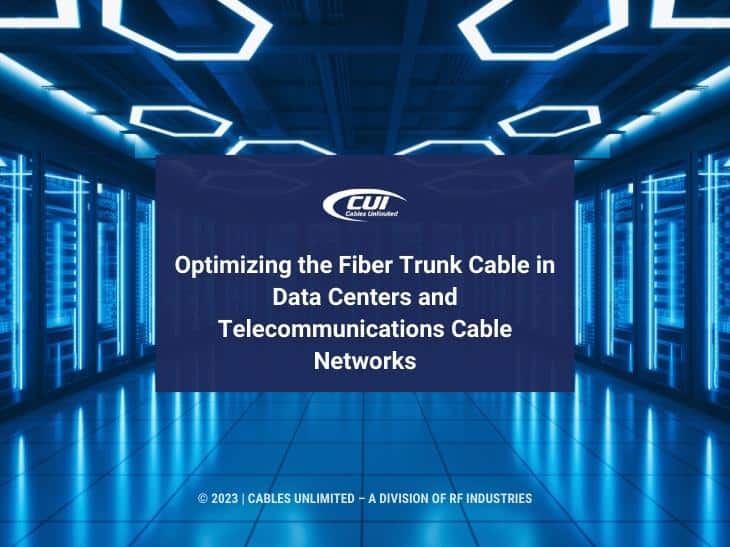The total volume of data created, consumed, and stored worldwide is estimated at 120 zettabytes and is expected to climb to over 180 zettabytes by 2025. Data centers manage all that data using at least one fiber trunk cable, a vital part of a data center, and one critical telecommunication cable, among many.
This article defines data center and fiber trunk cable, examines the critical specifications for a fiber trunk cable, and includes an overview of the custom data cables, custom cable assembly, and hybrid cables used extensively within a data center.
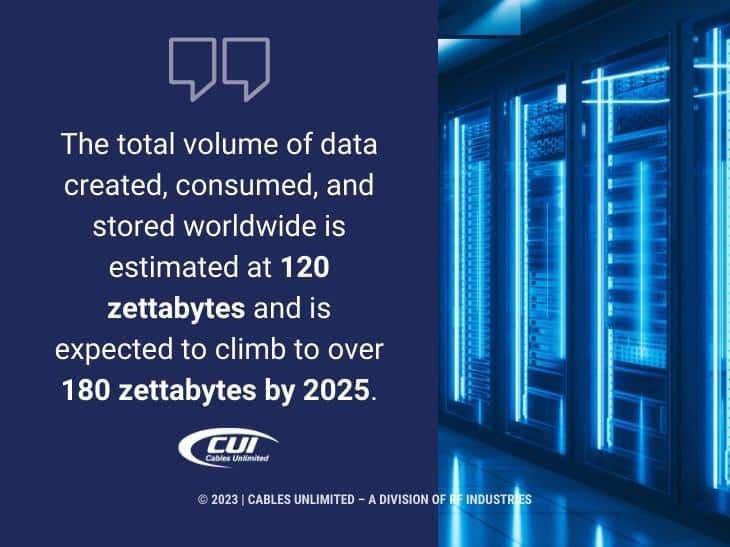
What Is a Data Center?
A data center is a building or room that houses a computer and its support areas. Its primary function is to centralize information technology resources and network operations. That includes routers, switches, firewalls, storage systems, servers, and application-delivery controllers. They provide network and storage infrastructure for all computing resources.
What Is a Fiber Trunk Cable?
A fiber trunk cable is a fiber optic cable assembly used in data centers, storage area networks, high-speed computers, remote device connections, and Ethernet protocols. It is a high-density cable that provides more efficient connectivity than multiple cables with multiple connectors and field terminations. It also takes up less space, which allows cabling and system expansion within an existing area.
It is built to include the terminations and breakout cables needed for a specific installation from various fiber types, any number of fibers, and different types of connectors. It is made using a custom cable jacket, providing temperature resistance, water resistance, and more, allowing indoor or outdoor use as specified.
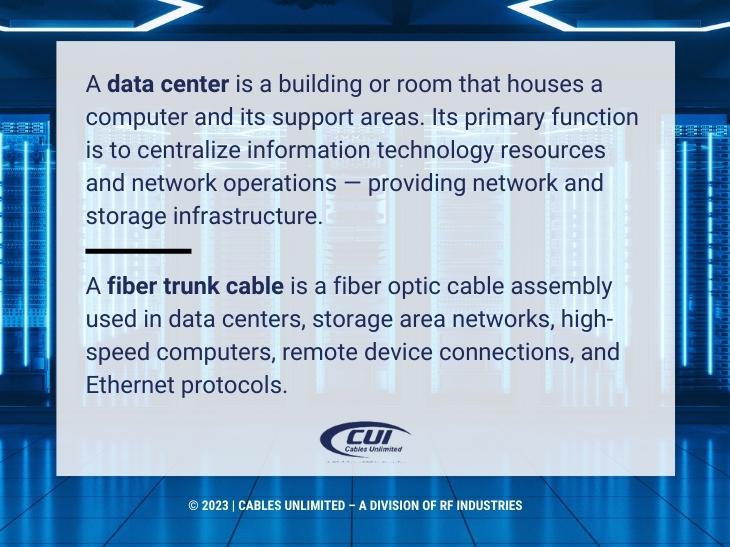
What Are the Key Specifications for a Fiber Trunk Cable?
Several critical specifications exist for a fiber trunk cable in the data center and in telecommunications cable networks.
- Connector Types. A wide range of connector types can be specified for fiber trunk cables, including different connectors on each cable end.
- Armoring. This can include interlocking aluminum or corrugated steel armor designed for indoor or outdoor use.
- Termination. A fiber trunk cable can be pre-terminated, allowing quick and trouble-free installation in the field. Or, if the needed cable length changes from one installation to the next, field termination can be used. Of course, a cable can also be specified as pre-terminated on one end and field terminated on the other.
- Breakout Length. Each breakout from the fiber trunk cable must be specified for the specific installation. That includes length, number of cables, etc.
- Pulling Eye. During fiber trunk cable installation, the fiber and connector must be protected from any pulling force. A pulling eye and sleeve can be specified for the end of the cable that will be pulled during installation.
- Labeling. Standard or custom labeling can be included with each fiber trunk cable. It can match industry standards or the existing labeling system within the data center or telecommunication cable network.
All these fiber trunk cable specifications, taken together, can optimize the performance of the data center or telecommunications cable network. But performance optimization doesn’t stop there. It must extend throughout the data center, including for custom data cables, any custom cable assembly, and hybrid cables.
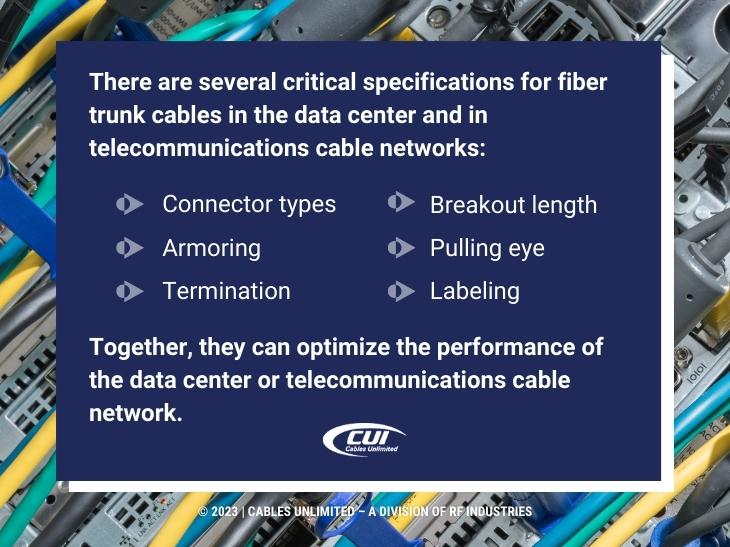
Custom Data Cables and Custom Cable Assembly
Custom data cables are designed to meet the exact needs of a project, product, or application. They are often deployed in data centers as part of the telecommunication cable infrastructure.
A cable assembly is two or more conductors within a single insulating jacket. A custom cable assembly provides the advantages of pre-testing, manufacturing in quantity, and dropping into place in the field. Not only that but compared to field installation, a pre-terminated fiber optic custom cable assembly can save money.
You can find more information in our article Custom Fiber Optic Cable Assemblies: Cost and Time Advantages.
Custom Hybrid Cables
Hybrid cables consist of a single cable with multiple fibers, conductors, and connectors. They can contain various AWG-size wires, coaxial and ethernet cables, fiber optics, etc. They are also built with the exact jackets needed, including PVC, Plenum, and LSZH, which are heat, moisture, and UV resistant. Not only that, but they are also built with the exact type of shielding needed for each specific installation. Add the required strain reliefs, desired color, logos, and text, and you have hybrid cables.
For more, see our article Hybrid Cable Customization: Off-the-Shelf Cables Can’t Compete.
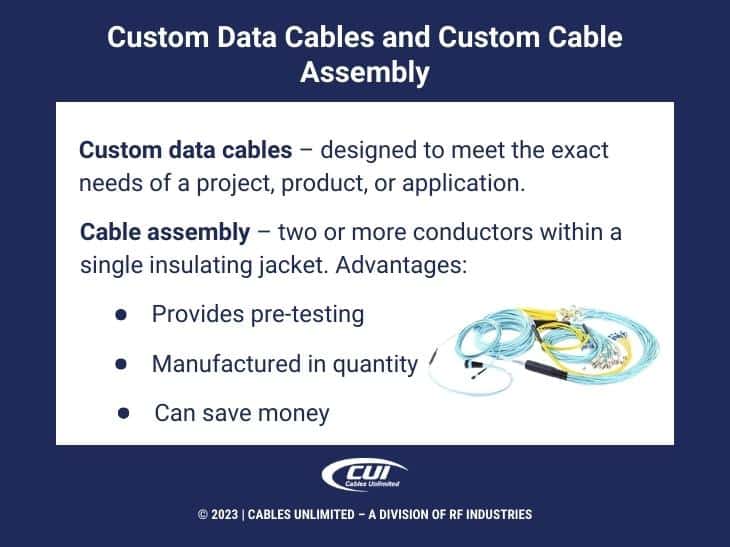
We Can Meet Your Fiber Trunk Cable Needs
As you’ve seen, the ever-expanding data center and telecommunication cable network require the best fiber trunk cables, custom data cables, custom cable assembly, and hybrid cables. That’s where Cables-Unlimited comes to the forefront, providing precisely what you need when you need it.
If your requirements are already specified and ready for a quote for your current projects, we are prepared to meet your deadlines and pricing targets. Our extensive in-house services and advanced manufacturing capabilities are in place to meet your requirements.
But Cables-Unlimited offers much more than state-of-the-art manufacturing – our dedicated team is also known for going to great lengths to meet the needs of our customers, including working round-the-clock to meet tight turnaround time requirements.
Our sales representatives are standing by to assist you with product questions and quotes Monday – Friday, 8:00 am to 5:00 pm Eastern. Of course, you can also email us or complete our contact form, and we’ll get right back to you.

